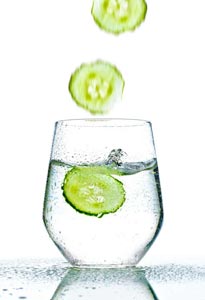 Proper hydration is one of the most important aspects of healthy living. Just look at what happens when you water a plant. It perks up and seems to spread itself towards the Sun. Nearly all the life on this planet exists only because of water. Human beings can survive for weeks without food, but only three days without water. While there are parts of the world where people do not have access to clean drinking water, many of us are blessed to have water literally on tap that only needs to be filtered to make it safe to drink. It’s such a blessing, and yet many people in the West are chronically dehydrated.
Proper hydration is one of the most important aspects of healthy living. Just look at what happens when you water a plant. It perks up and seems to spread itself towards the Sun. Nearly all the life on this planet exists only because of water. Human beings can survive for weeks without food, but only three days without water. While there are parts of the world where people do not have access to clean drinking water, many of us are blessed to have water literally on tap that only needs to be filtered to make it safe to drink. It’s such a blessing, and yet many people in the West are chronically dehydrated.
All our organs use water for nourishment and lubrication. Blood, lymph and most other bodily fluids are based on water. Dehydration can cause headaches, nausea, vision problems, muscle cramping, urinary tract infections, high cholesterol, and fatigue. Severe or chronic dehydration can lead to vomiting, muscle spasm, and failure of the liver and kidneys before it finally kills us. Hydration also affects our metabolism and thus our ability to lose weight.
Hydration means more than gulping water occasionally. It is a long-term process that requires receiving plenty of water every day. To be truly hydrated, electrolytes are also necessary. Electrolytes are the conduits of the electrical impulses that stimulate activities like muscle contractions and nerve reactions. In a body that is sufficiently hydrated, the kidneys maintain the proper electrolyte concentrations through any level of heat or physical activity. If the hydration or electrolyte levels get too low, it becomes much more challenging for the kidneys to maintain homeostasis. Electrolyte balance is supported by adding fresh lemon or lime juice, a dash of Celtic sea salt, or a trace minerals concentrate to your water. Potassium broth and fresh (not canned) young coconut water help, as well.
Hydration is vital everyday, but especially so when one is detoxifying. The toxins that are released into the bloodstream need to be flushed out. The colon needs to be hydrated for proper elimination. Basically all of the cleansing and circulating systems of the body become more sluggish when one is dehydrated. Trying to detoxify a sluggish body can be counter-effective or dangerous. Many of the unpleasant side effects and dangers of cleansing can be mitigated by adequate hydration. Drinking plenty of water also helps stave off hunger pains if you are eating less food than the amount to which you are accustomed.
It is important to drink pure water. Most tap water, and even some bottled water, is contaminated with countless chemical additives, industrial by-products, and pharmaceutical residue. Some of the most dangerous are arsenic, mercury, pesticides, lead, aluminum, fluoride, chlorine, prescription drugs, and even radiation in some areas. Purchasing bottled water is not advised. Legally, only 70 percent of a bottle of water needs to come from a “spring” or other pure source, and the remaining 30 percent could be tap water. Chemicals from the plastic bottle can leach into the water and contaminate it. And bottling and shipping water takes a high toll on the Earth’s resources and creates more waste. A high-quality filter is recommended, and will save you money over bottled water in the long run. The most effective are two-chamber gravity models such as those manufactured by the Berkey Company, though other carbon filtration models will work, too.
A healthy person who is not cleansing or detoxing should consume one half of his or her body weight (in pounds) in ounces of water each day. So for a 180 pound person, that would be 90 ounces. When one is detoxing, usually even more water (or liquid in the form of vegetable juices and herbal tea) is required to support the cleansing process. Be sure that most of the water you drink has some form of bio-available electrolyte to support hydration as well as flushing (I find that lemon is the simplest choice for me). One way to tell if you are properly hydrated is to check your urine. If it is a very pale yellow or nearly clear, you are most likely sufficiently hydrated. If it is dark or bright yellow, then you need to drink more water. Sorry to be so graphic, but it’s the truth (however if you have any health issues…they can affect urine color as well).
It is best to drink all of your day’s water before 7p.m. whenever possible. The kidneys go into recharge mode at that time, and will function more optimally when you are not drinking a whole lot of fluids between 7 and 10p.m. The best time to drink copious amounts of water is first thing in the morning. Tip: Drinking one or two quarts of warm water with lemon and pinch of cayenne is a great jumpstart for your day.



Comment Via Facebook